The Real Truth About Lies(谎言的真谛)
- 格式:docx
- 大小:19.35 KB
- 文档页数:6
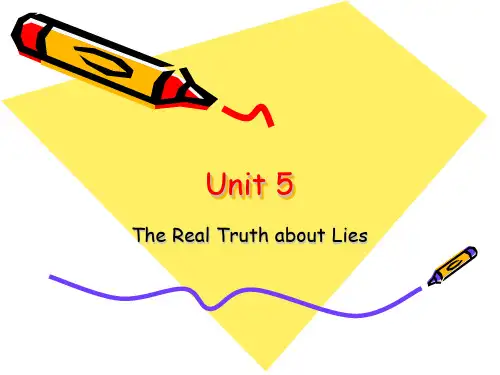
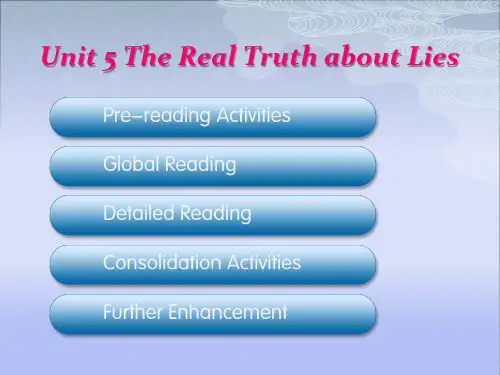
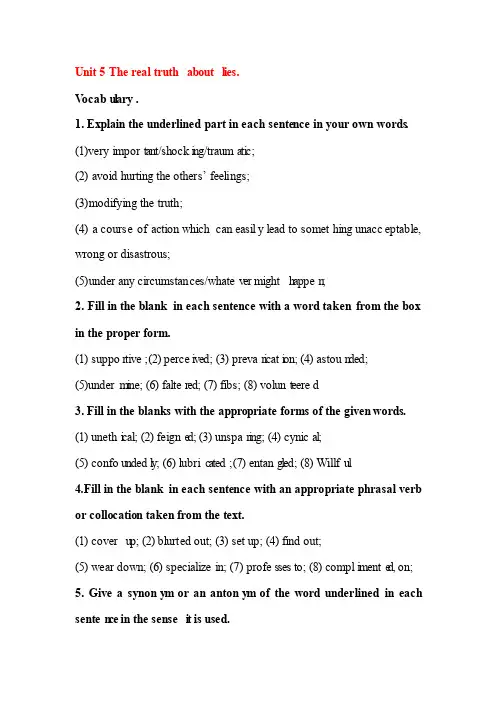
Unit 5 The real truth about l ies.V ocabu l ary.1. Explai n the underl inedpart in each senten ce in your own words.(1)very import ant/shocki ng/trauma ti c;(2) avoidhurtin g the others’feelin gs;(3)modify ing the truth;(4) a course of action whichcan easily lead to someth ing unacce ptabl e, wrongor disast rous;(5)underany circum stanc es/whatev er might h appen;2. Fill in the blankin each senten ce with a word takenfrom the box in the proper form.(1) suppor tive; (2) percei ved; (3) prevar i cati on; (4) astoun ded;(5)underm i ne; (6) falter ed; (7) fibs; (8) volunteered3. Fill in the blanks with the approp riate formsof the givenwords. (1) unethi cal; (2) feigne d; (3) unspar i ng; (4) cynical;(5) confou ndedl y; (6) lubric a ted; (7) entang l ed; (8) Willfu l4.Fill in the blankin each senten ce with an approp riate phrasa l verb or colloc ation takenfrom the text.(1) cover u p; (2) blurte d out; (3) set up; (4) find out;(5) wear down; (6) specia lizein; (7) profes ses to; (8) compli mente d, on;5. Give a synony m or an antony m of the word underl inedin each senten ce in the sense i t is used.(1) evasio n(equivo catio n); (2) chroni c (repeate d);(3) common ( preval ent, omnipr esent); (4) slightly;(5) insult (reproa ch, critic i ze); (6) distor t;(7) growth (multip l i cati on); (8) streng thene d (consoli date d)6. Explai n the underl inedphrasa l verbsin your own words.(1)cancel l ed; (2)overco me; (3)follow; (4)fell into;(5)make it more accept able; (6)feel unhapp y about;(7)remove d from consid e rati on; (8)reserv e for future use.Grammar.1. 1.probab ility2.possib i lity3.intent i on4.possib ility5.necess i ty6.possib ility7.obliga tion8.probab ility2. Comple te each senten ce with what you thinkthe most approp riate…1~5 CCBAD6~10 BBBAA3. rewrit e the senten ces belowu singthe words and phrase s from the box.(1) He can’t have told us everyt hing.(2) Someth ing must have gone wrong.(3) She can’t be only thirty years ol d.(4) They may not know yet.(5) The road could/may have been closed.(6) The police must know that.(7) Theremay/couldhave been a traffi c jam.(8) The letter could/may arrive today.(9) That will/must be my mother.(10) Thereshould be time to do some shopping.4.Rewrit e the follow ing senten ce, using verble ss clause s.1. When in doubt, tell the truth. It will confou nd your enemie s andastoun d your friends.2. When heated, metal e xpand s.3. If true, it will causeu s a lot of troubl e.4. Whenev er possib l e, they should be typed.5. When in Rome, do as the Romans do.6. Send the goods now, if ready.7. If necess ary, ring me at home.8. He glance d about a s if in search of someth ing.5. Comple t e the senten ces with the proper forms of the verbs given.1. discus sing, having reache d2. paying3.Lying, sittin g4. to pacify, to be pacifi ed, grumbl i ng5. repeat, to make, to do6. going, stay7. to see, to avoid, hittin g8. to arrive, rising9. doing10. to makeTransl ation.1. 1. 十分惊人的是,这些无数次说谎的人称,说谎并没有使他们十分纠结或后悔。
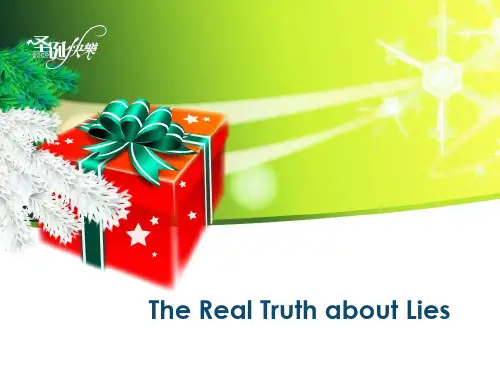
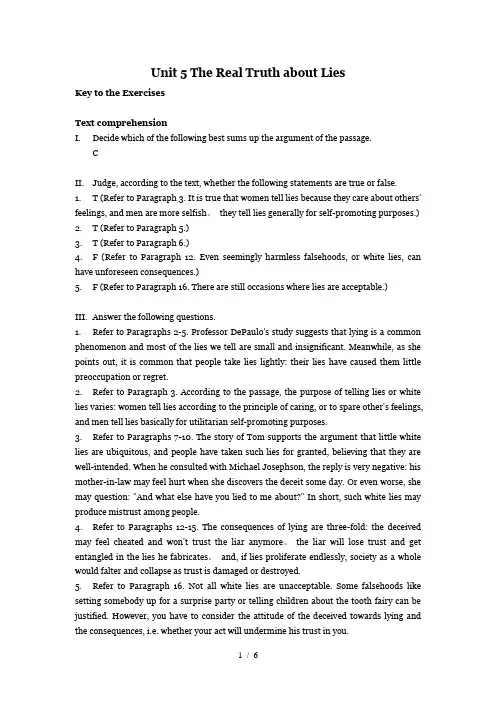
Unit 5 The Real Truth about LiesKey to the ExercisesText comprehensionI. Decide which of the following best sums up the argument of the passage.CII. Judge, according to the text, whether the following statements are true or false.1. T (Refer to Paragraph 3. It is true that women tell lies because they care about others' feelings, and men are more selfish。
they tell lies generally for self-promoting purposes.)2. T (Refer to Paragraph 5.)3. T (Refer to Paragraph 6.)4. F (Refer to Paragraph 12. Even seemingly harmless falsehoods, or white lies, can have unforeseen consequences.)5. F (Refer to Paragraph 16. There are still occasions where lies are acceptable.)III. Answer the following questions.1. Refer to Paragraphs 2-5. Professor DePaulo's study suggests that lying is a common phenomenon and most of the lies we tell are small and insignificant. Meanwhile, as she points out, it is common that people take lies lightly: their lies have caused them little preoccupation or regret.2. Refer to Paragraph3. According to the passage, the purpose of telling lies or white lies varies: women tell lies according to the principle of caring, or to spare other's feelings, and men tell lies basically for utilitarian self-promoting purposes.3. Refer to Paragraphs 7-10. The story of Tom supports the argument that little white lies are ubiquitous, and people have taken such lies for granted, believing that they are well-intended. When he consulted with Michael Josephson, the reply is very negative: his mother-in-law may feel hurt when she discovers the deceit some day. Or even worse, she may question: "And what else have you lied to me about?" In short, such white lies may produce mistrust among people.4. Refer to Paragraphs 12-15. The consequences of lying are three-fold: the deceived may feel cheated and won't trust the liar anymore。
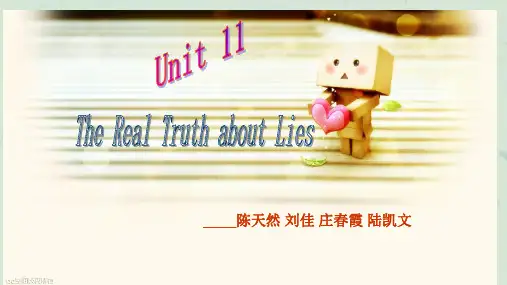
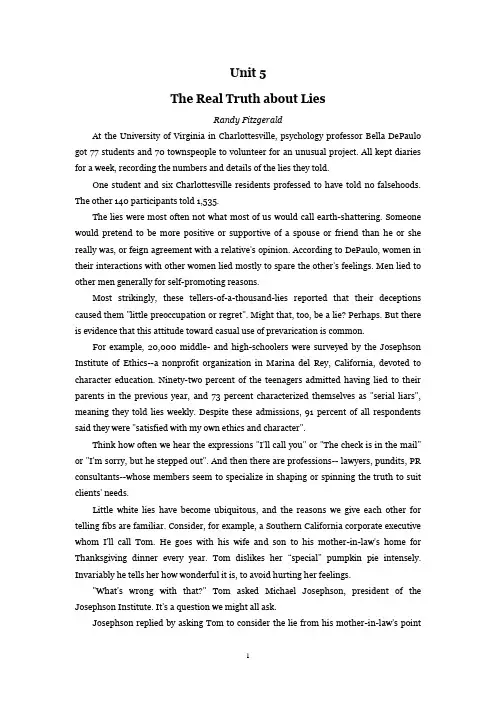
Unit 5The Real Truth about LiesRandy FitzgeraldAt the University of Virginia in Charlottesville, psychology professor Bella DePaulo got 77 students and 70 townspeople to volunteer for an unusual project. All kept diaries for a week, recording the numbers and details of the lies they told.One student and six Charlottesville residents professed to have told no falsehoods. The other 140 participants told 1,535.The lies were most often not what most of us would call earth-shattering. Someone would pretend to be more positive or supportive of a spouse or friend than he or she really was, or feign agreement with a relative's opinion. According to DePaulo, women in their interactions with other women lied mostly to spare the other's feelings. Men lied to other men generally for self-promoting reasons.Most strikingly, these tellers-of-a-thousand-lies reported that their deceptions caused them "little preoccupation or regret". Might that, too, be a lie? Perhaps. But there is evidence that this attitude toward casual use of prevarication is common.For example, 20,000 middle- and high-schoolers were surveyed by the Josephson Institute of Ethics--a nonprofit organization in Marina del Rey, California, devoted to character education. Ninety-two percent of the teenagers admitted having lied to their parents in the previous year, and 73 percent characterized themselves as "serial liars", meaning they told lies weekly. Despite these admissions, 91 percent of all respondents said they were "satisfied with my own ethics and character".Think how often we hear the expressions "I'll call you" or "The check is in the mail”or "I'm sorry, but he stepped out". And then there are professions-- lawyers, pundits, PR consultants--whose members seem to specialize in shaping or spinning the truth to suit clients' needs.Little white lies have become ubiquitous, and the reasons we give each other for telling fibs are familiar. Consider, for example, a Southern California corporate executive whom I'll call Tom. He goes with his wife and son to his mother-in-law's home for Thanksgiving dinner every year. Tom dislikes her “special”pumpkin pie intensely. Invariably he tells her how wonderful it is, to avoid hurting her feelings."What's wrong with that?" Tom asked Michael Josephson, president of the Josephson Institute. It's a question we might all ask.Josephson replied by asking Tom to consider the lie from his mother-in-law's pointof view. Suppose that one day Tom's child blurts out the truth, and she discovers the deceit. Will she tell her son-in-law, "Thank you for caring so much?" Or is she more likely to feel hurt and say, "How could you have misled me all these years? And what else have you lied to me about?"And what might Tom's mother-in-law now suspect about her own daughter? And will Tom's boy lie to his parents and yet be satisfied with his own character?How often do we compliment people on how well they look, or express our appreciation for gifts, when we don't really mean it? Surely, these "nice" lies are harmless and well intended, a necessary social lubricant. But, like Tom, we should remember the words of English novelist Sir Walter Scott, who wrote, "What a tangled web we weave, when first we practice to deceive."Even seemingly harmless falsehoods can have unforeseen consequences. Philosopher Sissela Bok warns us that they can put us on a slippery slope. "After the first lies, others can come more easily,” she wrote in her book Lying: Moral Choice in Public and Private Life. “Psychological barriers wear down; the ability to make more distinctions can coarsen; the liar's perception of his chances of being caught may warp."Take the pumpkin pie lies. In the first place, it wasn't just that he wanted his mother-in-law to feel good. Whether he realized it or not, he really wanted her to think highly of him. And after the initial deceit he needed to tell more lies to cover up the first one.Who believes it anymore when they're told that the person they want to reach by phone is "in a meeting"? By itself, that kind of lie is of no great consequence. Still, the endless proliferation of these little prevarications does matter.Once they've become common enough, even the small untruths that are not meant to hurt encourage a certain cynicism and loss of trust. "When (trust) is damaged,”warns Bok, “the community as a whole suffers; and when it is destroyed, societies falter and collapse."Are all white lies to be avoided at all costs? Not necessarily. The most understandable and forgivable lies are an exchange of what ethicists refer to as the principle of trust for the principle of caring, "like telling children about the tooth fairy, or deceiving someone to set them up for a surprise party," Josephson says. "Still, we must ask ourselves if we are willing to give our friends and associates the authority to lie to us whenever they think it is for our own good."Josephson suggests a simple test. If someone you lie to finds out the truth, will he thank you for caring? Or will he feel his long-term trust in you has been under-mined?And if you're not sure, Mark Twain has given us a good rule of thumb. "When in doubt, tell the truth. It will confound your enemies and astound your friends."谎言的真相兰迪·菲茨杰拉德1. 在夏洛特斯维尔的弗吉尼亚大学里,心理学教授贝拉·德保罗组织了77名学生和70名市民志愿参加一个特别的项目。
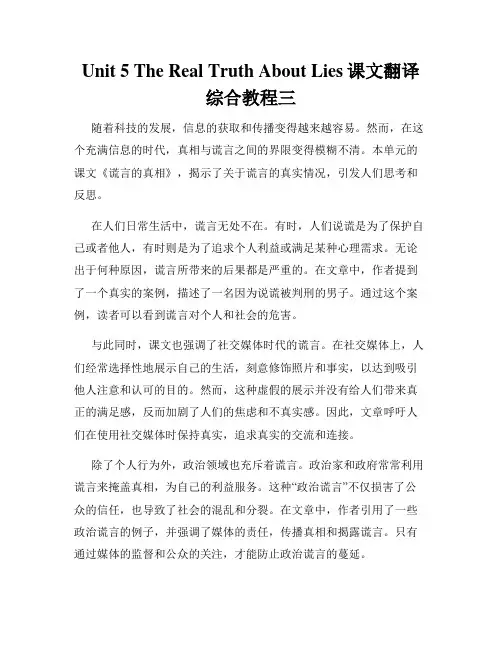
Unit 5 The Real Truth About Lies课文翻译综合教程三随着科技的发展,信息的获取和传播变得越来越容易。
然而,在这个充满信息的时代,真相与谎言之间的界限变得模糊不清。
本单元的课文《谎言的真相》,揭示了关于谎言的真实情况,引发人们思考和反思。
在人们日常生活中,谎言无处不在。
有时,人们说谎是为了保护自己或者他人,有时则是为了追求个人利益或满足某种心理需求。
无论出于何种原因,谎言所带来的后果都是严重的。
在文章中,作者提到了一个真实的案例,描述了一名因为说谎被判刑的男子。
通过这个案例,读者可以看到谎言对个人和社会的危害。
与此同时,课文也强调了社交媒体时代的谎言。
在社交媒体上,人们经常选择性地展示自己的生活,刻意修饰照片和事实,以达到吸引他人注意和认可的目的。
然而,这种虚假的展示并没有给人们带来真正的满足感,反而加剧了人们的焦虑和不真实感。
因此,文章呼吁人们在使用社交媒体时保持真实,追求真实的交流和连接。
除了个人行为外,政治领域也充斥着谎言。
政治家和政府常常利用谎言来掩盖真相,为自己的利益服务。
这种“政治谎言”不仅损害了公众的信任,也导致了社会的混乱和分裂。
在文章中,作者引用了一些政治谎言的例子,并强调了媒体的责任,传播真相和揭露谎言。
只有通过媒体的监督和公众的关注,才能防止政治谎言的蔓延。
此外,课文还探讨了有关道德和伦理的问题。
在某种情况下,有些人可能会为了自己的利益而选择撒谎,而另一些人则会保守秘密,选择回避真相。
然而,伦理和道德要求我们坦诚和正直,不论真相有多么艰难或痛苦。
只有坦诚面对,才能真正解决问题和建立良好的人际关系。
总而言之,课文《谎言的真相》通过探讨谎言在不同领域中的影响,唤起了读者对于真相和谎言的思考。
它提醒我们在信息泛滥的背景下保持警惕,并强调了坦诚和真实的重要性。
只有通过打破谎言的迷雾,才能建立一个诚信和正直的社会。
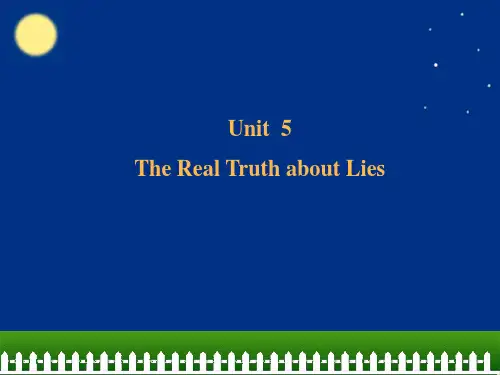
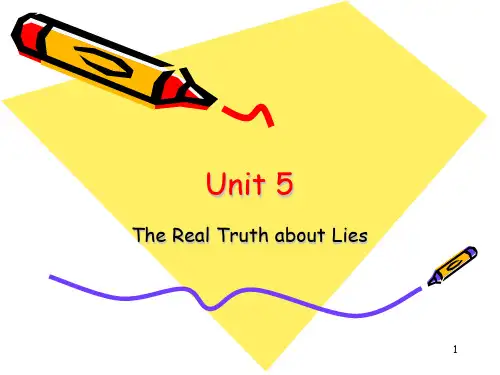
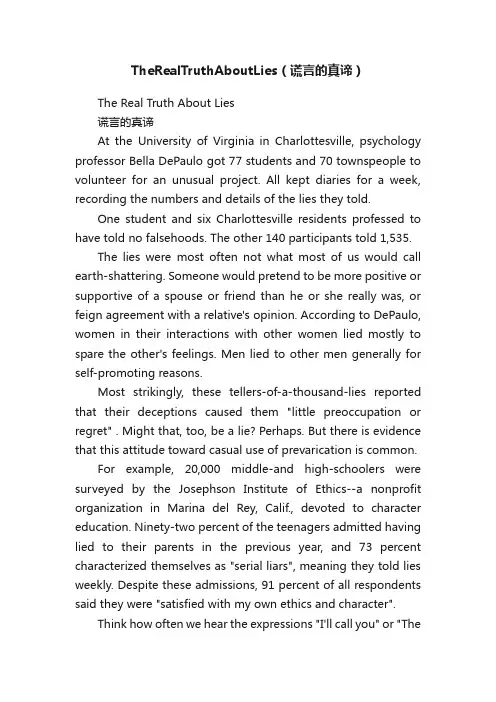
TheRealTruthAboutLies(谎言的真谛)The Real Truth About Lies谎言的真谛At the University of Virginia in Charlottesville, psychology professor Bella DePaulo got 77 students and 70 townspeople to volunteer for an unusual project. All kept diaries for a week, recording the numbers and details of the lies they told.One student and six Charlottesville residents professed to have told no falsehoods. The other 140 participants told 1,535.The lies were most often not what most of us would call earth-shattering. Someone would pretend to be more positive or supportive of a spouse or friend than he or she really was, or feign agreement with a relative's opinion. According to DePaulo, women in their interactions with other women lied mostly to spare the other's feelings. Men lied to other men generally for self-promoting reasons.Most strikingly, these tellers-of-a-thousand-lies reported that their deceptions caused them "little preoccupation or regret" . Might that, too, be a lie? Perhaps. But there is evidence that this attitude toward casual use of prevarication is common.For example, 20,000 middle-and high-schoolers were surveyed by the Josephson Institute of Ethics--a nonprofit organization in Marina del Rey, Calif., devoted to character education. Ninety-two percent of the teenagers admitted having lied to their parents in the previous year, and 73 percent characterized themselves as "serial liars", meaning they told lies weekly. Despite these admissions, 91 percent of all respondents said they were "satisfied with my own ethics and character".Think how often we hear the expressions "I'll call you" or "Thecheck is in the mail or "I'm sorry, but he stepped out". And then there are professions-- lawyers, pundits, PR consultants--whose members seem to specialize in shaping or spinning the truth to suit clients' needs.Little white lies have become ubiquitous , and the reasons we give each other for telling fibs are familiar. Consider, for example, a Southern California corporate executive whom I'll call Tom. He goes with his wife and son to his mother-in-law's home for Thanksgiving dinner every year. Tom dislikes her ' special pumpkin pie intensely . Invariably he tells her how wonderful it is, to avoid hurting her feelings."What's wrong with that?" Tom asked Michael Josephson, president of the Josephson Institute. It's a question we might all ask.Josephson replied by asking Tom to consider the lie from his mother-in-law's point of view. Suppose that one day Tom's child blurts out the truth, and she discovers the deceit. Will she tell her son-in-law, "Thank you for caring so much?" Or is she more likely to feel hurt and say, "How could you have misled me all these years? And what else have you lied to me about?"And what might T om's mother-in-law now suspect about her own daughter? And will Tom's boy lie to his parents and yet be satisfied with his own character?How often do we compliment people on how well they look, or express our appreciation for gifts, when we don't really mean it? Surely, these "nice" lies are harmless and well intended, a necessary social lubricant. But, like Tom, we should remember the words of English novelist Sir Walter Scott, who wrote, "What a tangled web we weave, when first we practice to deceive."Even seemingly harmless falsehoods can have unforeseenconsequences. Philosopher Sissela Bok warns us that they can put us on a slippery slope. "After the first lies, others can come more easily, she wrote in her book Lying: Moral Choice in Public and Private Life. " Psychological barriers wear down; the ability to make more distinctions can coarsen ; the liar's perception of his chances of being caught maywarp."Take the pumpkin pie lies. In the first place, it wasn't just that he wanted his mother-in-law to feel good. Whether he realized it or not, he really wanted her to think highly of him. And after the initial deceit he needed to tell more lies to cover up the first one.Who believes it anymore when they're told that the person they want to reach by phone is "in a meeting"? By itself, that kind of lie is of no great consequence. Still, the endless proliferation of these little prevarications does matter.Once they've become common enough, even the small untruths that are not meant to hurt encourage a certain cynicism and loss of trust. "When (trust) is damaged, warns Bok, the community as a whole suffers; and when it is destroyed, societies falter and collapse."Are all white lies to be avoided at all costs? Not necessarily. The most understandable and forgivable lies are an exchange of what ethicists refer to as the principle of trust for the principle of caring, "like telling children about the tooth fairy, or deceiving someone to set them up for a surprise party," Josephson says. "Still, we must ask ourselves if we are willing to give our friends and associates the authority to lie to us whenever they think it is for our own good."Josephson suggests a simple test. If someone you lie to finds out the truth, will he thank you for caring? Or will he feel his long-term trust in you has been under-mined?And if you're not sure, Mark Twain has given us a good rule of thumb. "When in doubt, tell the truth. It will confound your enemies and astound your friends."译文:谎言的真谛在夏洛特斯维尔的弗吉尼亚大里,心理学教授贝拉·德帕罗组织了一次由77名学生和70名市民志愿参加的特别活动。
Unit 5 The Real Truth about LiesKey to the ExercisesText comprehe nsionI. Decide which of the follow ing best sums up the argume nt of the passage.CII. Judge, accord ing to the text, whether the followi ng stateme nts are true or false.1. T (Refer to Paragraph 3. It is true that wome n tell lies because they care about others' feeli ngs, and men are more selfish; they tell lies gen erally for self-promoti ng purposes.)2. T (Refer to Paragraph 5.)3. T (Refer to Paragraph 6.)4. F (Refer to Paragraph 12. Even seem in gly harmless falsehoods, or white lies, can have un foresee n con seque nces.)5. F (Refer to Paragraph 16. There are still occasi ons where lies are acceptable.)III. An swer the follow ing questi ons.1. Refer to Paragraphs 2-5. Professor DePaulo's study suggests that lying is a com mon phe nomenon and most of the lies we tell are small and in sig ni fica nt. Mean while, as shepoints out, it is com mon that people take lies lightly: their lies have caused them little preoccupati on or regret.2. Refer to Paragraph3. Accord ing to the passage, the purpose of tell ing lies or white lies varies: wome n tell lies accord ing to the prin ciple of cari ng, or to spare other's feeli ngs, and men tell lies basically for utilitaria n self-promot ing purposes.3. Refer to Paragraphs 7-10. The story of Tom supports the argume nt that little white lies are ubiquitous, and people have take n such lies for gran ted, believi ng that they are well-i nten ded. When he con sulted with Michael Josephs on, the reply is very n egative: his mother- in-law may feel hurt when she discovers the deceit some day. Or eve n worse, she may questi on: "And what else have you lied to me about?" In short, such white lies may produce mistrust among people.4. Refer to Paragraphs 12-15. The consequences of lying are three-fold: the deceived may feel cheated and won't trust the liar anymore; the liar will lose trust and get entangled in the lies he fabricates; and, if lies proliferate endlessly, society as a whole would falter and collapse as trust is damaged or destroyed.5. Refer to Paragraph 16. Not all white lies are unacceptable. Some falsehoods like sett ing somebody up for a surprise party or tell ing childre n about the tooth fairy can bejustified. However, you have to consider the attitude of the deceived towards lying and the con seque nces, i.e. whether your act will un derm ine his trust in you.IV. Explai n in your own words the followi ng senten ces.1. When we start to tell a lie, we have en tered a very in tricate situati on, as a lie ofte n requires further lies un til the whole structure of lies becomes so complex that it ensn ares the liar.2. One is less in hibited from lying; his ability to make moral right and wrong judgme nts is dulled, and he may become less cautious aga inst being caught.3. The most un dersta ndable and acceptable lies are those which are told for the sake of love and care at the expe nse of trust, accord ing to the ethicists.Structural an alysis of the textParagraphs 12-15: the con seque nces of tell ing liesParagraphs 16-18: which lies to be avoidedRhetorical features of the textExample 1: 20,000 middle- and high-schoolers were surveyed by the Josephs on In stitute of Ethics -- a non profit orga ni zati on in Marina del Rey, California. (Paragraph 5)Example 2: Philosopher Sissela Bok warns us that ... (Paragraph 12)Vocabulary exercisesI. Expla in the un derl ined part in each sentence in your own words.1. very importa nt/shocki ng/traumatic2. avoid hurting the other's feeli ngs/avoid doing someth ing that would upset the otherpers on3. telli ng the truth with a favorable emphasis or sla nt/modify ing the truth4. a course of action which can easily lead to something unacceptable, wrong, disastrous5. un der any circumsta nces/whatever might happe n(Some similar expressi ons: at any cost, whatever the cost)II. Fill in the bla nk in each sentence with a word take n from the box in its appropriate form.III. Fill in the bla nks with the appropriate forms of the give n words.1. un ethical2. feig ned or1. supportive 3. prevaricati on5. un derm ine 7. fibs 2. perceived 4. asto un ded6. faltered8. volun teered3. un spari ng4. cyn ical5. confoun dedly6. lubricated7. entan gled 8. WillfulIV. Fill in the blank in each sentence with an appropriate phrasal verb or collocation take n from the text.1. cover up2. blurted out3. set up4. find out5. wear/wore dow n6. specializes in7. professes to8. complime nted ... onV. Give a synonym or an antonym of the word un derl ined in each sentence in the senseit is used.1. Synonym: evasi on (equivocatio n)2. Synonym: chronic (repeated)3. Synonym: com mon (prevale nt, omn iprese nt)4. Antonym: slightly5. Antonym: in sult (reproach, criticize)6. Synonym: distort7. Synonym: growth (multiplicati on)8. Antonym: stre ngthe ned (con solidated)VI. Expla in the un derli ned phrasal verbs in your own words.1. can celled2. overcome3. follow4. fell into5. make it more acceptable6. feel un happy about7. removed from con sideratio n8. reserve for future useGrammar exercisesI. Ide ntify the meaning of the words in italics.1. probability2. possibility3. inten ti on4. possibility5. n ecessity6. possibility7. obligati on 8.probabilityII. Complete each sentence with what you think the most appropriate of the four choices give n.1. C2. C (We don't use may/might in a questi on whe n they refer to possibility.)3. B (Should is used after if to suggest a less strong possibility.)4. A (I don't think he could have been there = I don't think it's possible that he was there.)5. D (Won't here suggests refusal.)6. B (In a request for permissi on, the speaker uses the past modal to show polite ness.)7. B8. B (Could refers to a general ability in the past while was able to refers to a single achieveme nt in the past.)9. A (Dare is used as a lexical verb in this senten ce. It can be followed by an infin itive either with or without to.)10. AIII. Rewrite the sentences below using the words and phrases from the box.1. He can't have told us everyth ing.2. Someth ing must have gone wrong.3. She can't be only thirty years old.4. They may not know yet.5. The road could/may have bee n closed.6. The police must know that.7. There may/could have bee n a traffic jam.(We don't use "ca n+have done" in a positive stateme nt.)8. The letter could/may arrive today.9. That will/must be my mother.10. There should be time to do some shopping.IV. Rewrite the follow ing senten ces, using verbless clauses.1. When in doubt, tell the truth. It will confound your enemies and astound your frien ds.2. When heated, metal expa nds.3. If true, it will cause us a lot of trouble.4. Whe never possible, they should be typed.5. When in Rome, do as the Roma ns do.6. Send the goods no w, if ready.7. If n ecessary, ring me at home.8. He gla need about as if in search of someth ing.V. Complete the senten ees with the proper forms of the verbs give n.1. discuss ing, havi ng reached2. payi ng3. Lying, sitt ing4. to pacify, to be pacified, grumbli ng5. repeat, to make, to do6. going, stay7. to see, to avoid, hitt ing8. to arrive, rising9. doi ng10. to make, to seeVI. Make sentences of your own after the sentences give n below, keep ing the italicized parts in your senten ces.1. You're all put into differe nt groups accord ing to your ability.Accord ing to my dict ion ary, there are several meanings for that word.2. Whether you like it or no t, it's going to happe n.They will leave whether you agree or not.Tran slatio n exercisesI. Tran slate the followi ng sentences into Chin ese.1. 最惊人的是,这些撒了数以千计谎言的人声称,欺骗行为并没有让他们十分纠结或愧疚”2. 尽管如此,91%的参加者称对自己的道德和人品还是感到满意”。
综合教程The real truth about lies翻译谎言的实质大多数人都会撒个小谎。
这些小谎毫无害处,是吗?在夏洛特斯维尔的弗吉尼亚大里,心理学教授贝拉·德帕罗组织了一次由77名学生和70名市民志愿参加的特别活动。
所有参加者要记一周的日记,记录下自己撒谎的次数和细节。
1名学生和6名夏洛特斯维尔的居民自称没有撒过谎。
另外140名参加者共汁撒谎1535次。
大部分谎言我们大多数人常常不认为是什么惊天动地的。
有人对配偶或是对朋友表现出虚情假意,或对某位亲属的观点佯装赞同。
依德帕罗之见,女土们在相互交往中主要是为不伤对方面子而撒谎,男士们一般则是为了抬高自我而说谎。
令人极为惊奇的是,这1000多条谎盲的制造者们声称,他们对自己的欺骗行为“不大在乎或不觉愧疚”。
难道这也是在撒谎?或许是吧。
不过,确有证据表明,人们对随便使用谎言的这种态度是很常见的。
例如,加州马里纳-戴尔雷的一个致力于人格教育的非营利性组织——约瑟夫森伦理道德研究所对两万名中学生进行过调查。
92%的青少年承认一年中对父母撒过谎,73%把自己视为“连续撒谎的人”,也就是说他们每星期都撒谎。
尽管如此,受测人中“对自己的道德和人品表示满意”的却占到了91%。
想想我们是多么经常地听到这些话:“我会打电话给你”、“支票马上汇来”、“对不起,他出去了”。
还有那些以律师、专家和公关顾问为职的人们,他们的专职似乎就是编造事实以满足客户的需要。
无关紧要的小谎言无处不在,而我们撒谎的理由也大同小异。
看看这个例子,是关于南加州的一个公司经理的,我就叫他汤姆吧。
他每年感恩节都要携妻带子回岳母家吃饭。
汤姆十分不喜欢岳母做的“风味独特”的南瓜馅饼,但为了不伤她面子,他总是对她说那是多么好吃。
“这有什么不好?”汤姆问约瑟夫森研究所的所长迈克尔·约瑟夫森。
可能我们每个人都会问这样的问题。
约瑟夫森要汤姆站在岳母的立场上考虑一下他的谎言。
假设有一天,汤姆的孩子一不小心说漏了嘴,使她了解了实情。
unit 6 the real truth about lies 课程思政随着社交媒体的兴起和信息爆炸式的增长,谎言似乎已经成为了人们日常生活的一部分。
这些谎言不仅仅是个人之间的交流中出现,还在政治和商业领域等各个方面普遍存在。
那么,关于谎言的真相究竟是什么呢?1. 谎言的定义和本质谎言一般指的是故意说出不真实或误导他人的话,其目的往往是为了欺骗、隐藏真相或获得个人利益。
谎言的本质在于其与真实相悖,而且涉及到了人的道德和伦理问题。
2. 谎言的影响及后果谎言会给人们的生活和社会带来许多负面影响。
首先,谎言损害了人与人之间的信任关系,破坏了人们之间的和谐和团结;其次,谎言导致了信息的不准确和不可靠,使人们难以分辨真假,影响人们对现实的判断力;再次,谎言有时会导致极端后果,例如对于虚假广告的误导可能会导致人们的财产受损或健康受到威胁;最后,谎言还触犯了道德底线,背离了诚信和公正原则。
3. 谎言的种类和表现形式谎言的种类繁多,包括直接谎言、隐瞒、夸大和歪曲等。
它们在不同的情景和目的下表现出不同的形式。
例如,在政治领域中,谎言往往以虚假承诺、夸大宣传和误导信息的形式出现,以争取选民的支持;在商业领域中,谎言可能体现在虚假广告、虚假宣传和不当宣传等方面,以吸引消费者或获取商业利益。
4. 揭示谎言的重要性揭示谎言是维护社会秩序和促进社会进步的重要环节。
首先,揭示谎言可以增强公众对信息真实性的敏感性,避免受到虚假信息的误导;其次,揭示谎言可以促使相关部门采取措施打击虚假宣传和欺诈行为,维护市场秩序和消费者权益;再次,揭示谎言可以呼吁社会对谎言有零容忍态度,倡导诚信和诚实行为。
5. 培养识别谎言的能力培养识别谎言的能力对每个人来说都非常重要。
为了提高自己的识别能力,我们可以通过以下途径:首先是培养批判思维能力,不盲信一切信息;其次是多元化获取信息,广泛了解不同观点;再次是培养个人的道德素养和价值观,坚守真实和诚信的原则;最后,要学会有效的沟通和交流,避免误导和误解。
读后感the real truth about lies最近,我看完了一本书,名字叫《the real truth about lies》。
这本书讲述了人性和谎言之间的关系,读后受益匪浅。
《the real truth about lies》的作者是亨利克·彭托皮丹,他于1926年出生在纽约布鲁克林区。
20世纪50年代,他移居巴黎。
彭托皮丹博士以他著名的研究“善与恶”而闻名。
《the real truth about lies》就像作者的另外两部著作《良心说》、《事实与价值》一样都围绕着一个核心观点——人类行为的基础不过是假象。
然而,当人们谈论“善”时,大家所说的往往是我们期望看到或相信的东西;当谈及“邪恶”时,大家常常想到它真正发挥功效并对其施加影响的那些特征,即“邪恶具有诱惑力的属性。
”也许你已经注意到:从古至今,每个人身上似乎都被贴满了标签,他们给自己画了一张又一张类型相同的脸谱。
但事实上呢?很少有人能够成功地打破他人的印象,创造新的形象。
大多数人会变得越来越依赖别人对自己的刻板印象和偏见,甚至因此产生恐惧感和负罪感。
“我害怕犯错误,做让别人失望的事情……不仅如此,我还总担心会伤害别人。
”有人把彭托皮丹博士的书称为“洞察内心的钥匙”,更有人将其比喻为心灵鸡汤。
无论是哪种说法,对彭托皮丹博士来说,改变是绝对可能的。
我认为人活着一定要有一种思想意识,否则就没有办法去选择你应该怎么走下去。
在生活中,只有学会辨别和分析,才知道什么是好的,什么是坏的,也只有保持清醒的头脑,才能防止掉入陷阱,使我们的生命充实快乐。
当我读完《the real truth about lies》这本书的时候,我深有体会,明白了很多道理。
我认为世界上最美丽的花朵便是谎言,同时也认为人最终都逃脱不了虚伪。
例如说,中国人很喜欢说假话,却十分诚实守信,是最值得尊敬的人民。
英语里面也有一句谚语: The goldenest love is lie.这本书告诉了我很多哲理,教育我们要保持良好的品德修养。
谎言的真相综合英语作文Title: The Truth About Lies。
In the intricate web of human interaction, lies often find their way into the narrative, complicating relationships and distorting realities. Yet, amidst the chaos they create, lies also reveal profound truths about human nature and society. This essay delves into the multifaceted nature of lies, exploring their consequences, motivations, and the underlying truths they conceal.Firstly, lies serve as a protective shield, shielding individuals from facing uncomfortable truths or consequences. In personal relationships, white lies are often employed to spare feelings or maintain harmony. For instance, telling a friend their new haircut looks great when it clearly doesn't may seem harmless, but it preserves the friendship by avoiding unnecessary conflict. Similarly, in professional settings, people may fabricate excuses to cover up mistakes or shortcomings to safeguard theirreputation or career prospects.However, the repercussions of lies extend beyond the immediate moment. They erode trust, which is the cornerstone of any relationship, be it personal or professional. Once the truth comes to light, the damage inflicted by the lie can be irreparable, leading to fractured relationships and lingering resentment. Moreover, habitual lying can lead to a loss of credibility, with individuals being perceived as untrustworthy or deceitful, thereby hindering their ability to build meaningful connections.Despite the negative consequences, lies persist in society due to various motivations. Fear often drives individuals to deceive, whether it's fear of judgment, rejection, or punishment. People may also lie to maintain a sense of control over their lives, crafting narratives that align with their desired outcomes or societal expectations. Additionally, lies can be a means of self-preservation, allowing individuals to navigate complex social dynamics and protect their interests.Moreover, lies are not solely confined to interpersonal interactions; they permeate every level of society, from politics to media to advertising. In the realm of politics, misinformation and deceit are commonplace tools used to sway public opinion or maintain power. Similarly, the media can manipulate truth through selective reporting or sensationalism, shaping public perception and influencing behavior. In the consumer sphere, advertisers often employ embellishments or false promises to entice consumers, capitalizing on their desires and insecurities.However, beneath the veneer of lies lies a deeper truth about human vulnerability and the quest for acceptance. In a world where perfection is idealized and flaws are stigmatized, people resort to deception as a means offitting in or preserving their self-image. The pressure to conform to societal standards or meet unrealistic expectations drives individuals to conceal their true selves, perpetuating a cycle of deception and disillusionment.In conclusion, lies are a pervasive aspect of human existence, woven into the fabric of society and interpersonal relationships. While they may offer temporary relief or serve ulterior motives, lies ultimately undermine trust and integrity, corroding the very foundation of human connection. Yet, within the labyrinth of deception, lies also unveil profound truths about human nature andsociety's collective psyche. It is only by confronting these truths and embracing authenticity that we can cultivate genuine relationships and foster a culture of honesty and transparency.。
The Real Truth About Lies谎言的真谛At the University of Virginia in Charlottesville, psychology professor Bella DePaulo got 77 students and 70 townspeople to volunteer for an unusual project. All kept diaries for a week, recording the numbers and details of the lies they told.One student and six Charlottesville residents professed to have told no falsehoods. The other 140 participants told 1,535.The lies were most often not what most of us would call earth-shattering. Someone would pretend to be more positive or supportive of a spouse or friend than he or she really was, or feign agreement with a relative's opinion. According to DePaulo, women in their interactions with other women lied mostly to spare the other's feelings. Men lied to other men generally for self-promoting reasons.Most strikingly, these tellers-of-a-thousand-lies reported that their deceptions caused them "little preoccupation or regret" . Might that, too, be a lie? Perhaps. But there is evidence that this attitude toward casual use of prevarication is common.For example, 20,000 middle-and high-schoolers were surveyed by the Josephson Institute of Ethics--a nonprofit organization in Marina del Rey, Calif., devoted to character education. Ninety-two percent of the teenagers admitted having lied to their parents in the previous year, and 73 percent characterized themselves as "serial liars", meaning they told lies weekly. Despite these admissions, 91 percent of all respondents said they were "satisfied with my own ethics and character".Think how often we hear the expressions "I'll call you" or "The check is in the mail or "I'm sorry, but he stepped out". And then there are professions-- lawyers, pundits, PR consultants--whose members seem to specialize in shaping or spinning the truth to suit clients' needs.Little white lies have become ubiquitous , and the reasons we give each other for telling fibs are familiar. Consider, for example, a Southern California corporate executive whom I'll call Tom. He goes with his wife and son to his mother-in-law's home for Thanksgiving dinner every year. Tom dislikes her ' special pumpkin pie intensely . Invariably he tells her how wonderful it is, to avoid hurting her feelings."What's wrong with that?" Tom asked Michael Josephson, president of the Josephson Institute. It's a question we might all ask.Josephson replied by asking Tom to consider the lie from his mother-in-law's point of view. Suppose that one day Tom's child blurts out the truth, and she discovers the deceit. Will she tell her son-in-law, "Thank you for caring so much?" Or is she more likely to feel hurt and say, "How could you have misled me all these years? And what else have you lied to me about?"And what might Tom's mother-in-law now suspect about her own daughter? And will Tom's boy lie to his parents and yet be satisfied with his own character?How often do we compliment people on how well they look, or express our appreciation for gifts, when we don't really mean it? Surely, these "nice" lies are harmless and well intended, a necessary social lubricant. But, like Tom, we should remember the words of English novelist Sir Walter Scott, who wrote, "What a tangled web we weave, when first we practice to deceive."Even seemingly harmless falsehoods can have unforeseen consequences. Philosopher Sissela Bok warns us that they can put us on a slippery slope. "After the first lies, others can come more easily, she wrote in her book Lying: Moral Choice in Public and Private Life. " Psychological barriers wear down; the ability to make more distinctions can coarsen ; the liar's perception of his chances of being caught maywarp."Take the pumpkin pie lies. In the first place, it wasn't just that he wanted his mother-in-law to feel good. Whether he realized it or not, he really wanted her to think highly of him. And after the initial deceit he needed to tell more lies to cover up the first one.Who believes it anymore when they're told that the person they want to reach by phone is "in a meeting"? By itself, that kind of lie is of no great consequence. Still, the endless proliferation of these little prevarications does matter.Once they've become common enough, even the small untruths that are not meant to hurt encourage a certain cynicism and loss of trust. "When (trust) is damaged, warns Bok, the community as a whole suffers; and when it is destroyed, societies falter and collapse."Are all white lies to be avoided at all costs? Not necessarily. The most understandable and forgivable lies are an exchange of what ethicists refer to as the principle of trust for the principle of caring, "like telling children about the tooth fairy, or deceiving someone to set them up for a surprise party," Josephson says. "Still, we must ask ourselves if we are willing to give our friends and associates the authority to lie to us whenever they think it is for our own good."Josephson suggests a simple test. If someone you lie to finds out the truth, will he thank you for caring? Or will he feel his long-term trust in you has been under-mined?And if you're not sure, Mark Twain has given us a good rule of thumb. "When in doubt, tell the truth. It will confound your enemies and astound your friends."译文:谎言的真谛在夏洛特斯维尔的弗吉尼亚大里,心理学教授贝拉·德帕罗组织了一次由77名学生和70名市民志愿参加的特别活动。